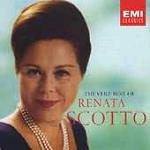Renata Scotto was one of the leading sopranos of the 1960s, a mainstay of the Met and the big European houses, and one of the sopranos of choice for producers of Puccini and Verdi operas. But recital discs don’t show her talents at their best, nor, with exceptions, does this one. Scotto was a singing actress whose primary strength lay in her ability to build a layered character over the full course of an opera. Isolated arias torn from their context emphasize the deficiencies of a distinctive voice that lacked the beauty of many of her peers. Callas could get away with it; Scotto, like others who modeled their careers after Sancta Maria, can’t. While she could peel off ravishing pianissimos, as we hear in the Puccini arias from La Boheme, Tosca, Turandot, Gianni Schicchi, and Madama Butterfly, thin, quavery high notes above mezzo-forte become increasingly annoying with the repetition inherent in recital discs. The problem is especially marked in material from the 1980s. It’s less so, but still present in embryonic form, in her earlier recordings, though she’s downright squally in “Signore, ascolta” from 1959. At times, her middle and lower voice takes on a clouded quality that may not be to all tastes.
But against that, Scotto possessed many strong attributes, as we hear most convincingly in the more than 30 minutes of excerpts from her famous Barbirolli-led recording of Madama Butterfly with Carlo Bergonzi and Rolando Panerei in good form. That thin top is still in evidence, but so too is her strong lyric soprano capable of dramatic utterance with no fear of losing out to the heavy orchestration. She brings focused tone and a variety of colors to her detailed characterization there. And in the pair of arias taken from the 1978 Muti recording of Verdi’s Nabucco, she successfully ventures into spinto territory–raw but extremely exciting–though the voice is beginning to show the deterioration that became acute shortly afterward.
To illustrate that point, EMI unwisely includes lengthy excerpts from Scotto’s 1982 complete recording of Verdi’s La Traviata, where the voice often seems about to fly out of control. Her Violetta is shorn of sympathy by abrasive singing, an effect intensified by the early digital sound. To set the seal on her versatility, EMI includes bel canto selections, including an edgy “Una voce poco fa” from Rossini’s Barber of Seville. In all, this is an uneven set, but one that serves as an introduction to an important singer, warts and all.
































